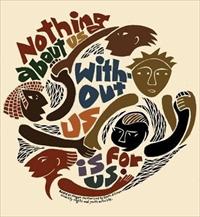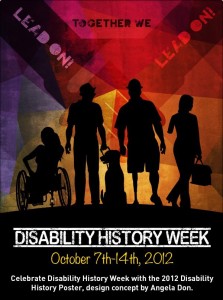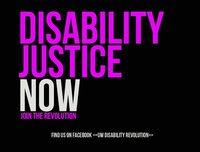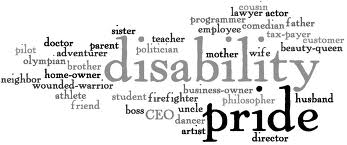To My White Brothers and Sisters: Fess Up. You Know What Zimmerman Was Thinking. Of Course You Do.
This piece is not explicitly disability related, but because all oppressions work along similar lines, many of the issues raised by the death of Trayvon Martin resonate in my experience as a disabled woman — particularly the whole question of who gets to occupy space and who gets treated with hostility for trying to do so. More and more, as I watch how people occupy space together, I see the outlines of how our society and its hierarchies are constructed. Racism is part of that. Ableism is part of that. All forms of bigotry are part of that. They intersect and they support one another, and they all rely on nearly full-scale denial that any of it is happening at all. This post is my attempt to break through one part of that denial.
The Department of Justice is opening an investigation into whether to indict George Zimmerman on civil rights charges in the death of Trayvon Martin. The bar for such prosecutions is high; the government must prove Zimmerman’s state of mind on the night that Trayvon was killed. In other words, they must prove that he followed and killed Trayvon because he was black.
This standard has been echoed on Internet comment forums in the words of people who keep repeating the same questions over, and over, and over: How do you know what was in George Zimmerman’s mind? How do you know that he was acting out of racist motives? Over and over, I hear people say that we shouldn’t judge the man, that we don’t know what was in his mind and heart, that we should be charitable and exercise caution in jumping to conclusions.
I have just one thing to say to that:
Bullshit.
Listen up, my white brothers and sisters. I’m white. You’re white. We can talk freely here, yes?
We all know very well what was in George Zimmerman’s mind, because the same thing is in our minds when we see a young black man in a hoodie walking down the street at night. Our shoulders tense up. We feel suspicion. We start thinking “danger.”
Most of us have the good sense to be ashamed that we feel that way. Most of us have the good sense not to follow the man.
But maybe we walk a little faster. Maybe we lock our car doors. Maybe we cross the street. Or maybe we take a deep breath, suck up the fear, and walk by that young black man in a hoodie hoping against hope that nothing bad happens.
You know it’s true.
I feel all of these fears. All of them. They go through my mind and body before I’m even aware of it happening. I keep myself from crossing the street and locking my car doors because I ‘ll be damned if I’m going to disrespect a man for using a public road.
But it’s horrifying to me that after several decades of knowing full well how racism works and how it demeans and how it kills that all of these suspicions course through me in a millisecond, before my head even has a chance to catch up. It’s as though something from the outside has come in without my consent — something that doesn’t originate in me but lives in me nonetheless.
I used to wonder how this could be. I was raised in an anti-racist household. My parents would never have forgiven me if a racial slur had ever come out of my mouth. They made me understand that my cozy little white corner of the world was an accident of fate, and that it was my responsibility to take my privilege and be the ally of people without that privilege. I’ve been working for peace and justice my whole life.
I was raised to know better. That’s the constant refrain I hear from my white brothers and sisters: How could I be racist? My parents raised me to treat everyone equally.
I’m here to tell you what you don’t want to hear: It doesn’t matter. When it comes to the impact of full-scale systemic racism, being well-raised doesn’t provide a force-field that protects anyone. At best, being well-raised provides a set of values and a mode of critique for the racism we carry and its dire consequences. But when it comes to protecting us from the indoctrination of an entire culture, the teachings of our individual upbringings cannot possibly compete with the constant, unrelenting, and merciless messages we’ve heard from the day we were born.
We were born into a cultural narrative that says that black men are aggressive, dangerous, and not to be trusted.
We were born into a cultural narrative in which the black man is always the aggressor, always at fault, always suspect.
We were born into a culture that speaks this narrative so often and with such force that there is nowhere to go to get away from it.
We were born into a culture in which fear and loathing and indoctrination into racism have been going on for centuries and will continue to go on after we’re gone. All we can do is fight them in the here and now so that maybe someday, they’ll be gone forever.
Now, if it makes your well-intentioned soul feel any better, I can tell you that the world you inherited is not your fault. It’s not your fault we’re all neck deep in this shit.
It’s not your fault that you were born into this world, but it’s your responsibility to admit to its hold on you and to stop pretending that oppressed people are over-reacting to the bigotry that swirls around them every damned day. It’s not your fault that all of this crap is in your head, but it’s your responsibility to acknowledge it and to root out as much of it as you can. It’s not your fault that you’ve been conditioned to feel fear, but it’s your responsibility to admit to the feeling in your gut when you see young black men walking down the street at night.
It’s not your fault that you feel all of these things, but it’s your responsibility to not let your shame keep you from being an ally of the people fighting them.
Yeah, it’s hard work. Yeah, no one wants to admit that they carry racism or ableism or homophobia or any other kind of bigotry. But guess what? We all do. Who can possibly escape these things when our entire culture is saturated with them?
I know it’s hard to hear someone suggest that maybe you’re not as neutral and as color-blind as you think you are. It’s painful. But while you’re feeling how hard it all is, please remember this: In the country in which you live, black men are taking their lives in their hands just to go out to get their groceries. Black men have to live with suspicion every time they try to occupy space. Black men have to live with white people pretending that none of this is happening.
Admitting to what’s in your mind and heart cannot possibly be as difficult as that. So go ahead and do it. Because it’s the secret that everyone already knows.
© 2013 by Rachel Cohen-Rottenberg









3 comments already | Leave your own comment
Debi
7/16/2013 | 1:47 pm Permalink
I’ve been trying to explain this very thing for ages, and you’ve done a better job than I ever could. This article is a “must share.” Thank-you!
Naamah
7/18/2013 | 4:39 am Permalink
Yes, yes, yes, so much yes.
And until we DO admit that, until we admit that those thoughts and urges are there, we literally have no chance of changing them. You have to be able to look at the ugliness of it to work to ameliorate the effect that ugliness has on the world and people around you.
People with any sort of privilege resist looking at this part of themselves because they don’t want to admit that they might have these bad thoughts. That would make them bad people, wouldn’t it? The funny part (not actually funny) is that actually admitting it and working to erase as much of it as you can and damage control the rest is actually the good person thing to do. And not admitting it, not questioning it aggressively, allowing it to remain, is the maybe-not-a-good-person thing to do.
You cannot fix what you are pretending is not broken.
Kaye
8/8/2013 | 7:02 am Permalink
“Listen up, my white brothers and sisters. I’m white. You’re white. We can talk freely here, yes?
We all know very well what was in George Zimmerman’s mind, because the same thing is in our minds when we see a young black man in a hoodie walking down the street at night. Our shoulders tense up. We feel suspicion. We start thinking “danger.”
Most of us have the good sense to be ashamed that we feel that way. Most of us have the good sense not to follow the man.
But maybe we walk a little faster. Maybe we lock our car doors. Maybe we cross the street. Or maybe we take a deep breath, suck up the fear, and walk by that young black man in a hoodie hoping against hope that nothing bad happens.
You know it’s true.”
I re-read this section several times to make sure I wasn’t just having a knee-jerk defensive response, but…no, it’s NOT true. It may be true of you and it may be true of many or even most whites. But while I certainly DO have a number of problematic reflexive mental reactions around race, THIS isn’t one of them. Young black men are part of my family and my community and my everyday experience, and thus do not engender automatic distrust or fear in me.
I don’t say this to pat myself on the back for not being one of THOSE whites. If anything it’s just mostly matter of desensitization/normalization from life in a majority black area, not any personal virtue of mine. No, I say this because I am disturbed by the notion that the young black men in my family and my community should get the message that EVERYONE with a face like mine fears them. That’s a hell of a thing to live with, because people with a face like mine are all around.
So while it’s laudable to confront your prejudice in this area, please don’t project them on to everyone else who happens to the be the same color as you, and please don’t speak for us all, either.